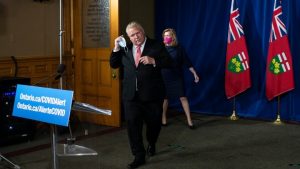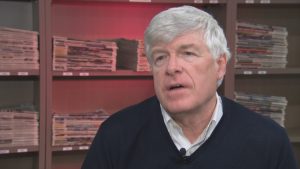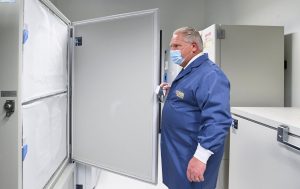Why Doug Ford’s daily COVID-19 news conferences have suddenly stopped

Premier Doug Ford’s run of near-daily news conferences about COVID-19 has abruptly come to a halt.
Ontario to begin vaccinations next week in Toronto, Ottawa
Since declaring a state of emergency in March, Ford has taken questions from reporters on 190 occasions, far more than any other premier or the prime minister. The briefings became a pandemic ritual, often watched by hundreds of thousands of Ontarians.
The decision by Ford’s political staff to put him in front of the camera so frequently stands in stark contrast from his previous two years in office, when his news conferences were rare and sometimes revealed his combative side.
Ford’s briefing scheduled for 3 p.m. Friday will be his first since Monday. This week’s decision to break with the daily routine after 39 weeks is deliberate, according to a senior member of his political staff.
“The most important objective right now is giving timely information about vaccines,” said Travis Kann, Ford’s director of communications.
“We don’t have daily information to share on that,” Kann told CBC News. “Absent a substantial and meaningful update, when all of the questions would be about vaccines, we don’t want to put the premier in a position of leaving people asking for more information.”
The move to cease daily news conferences, coupled with the adjournment of the legislature until mid-February, means neither Ford nor Health Minister Christine Elliott faces daily questions from the media at a time when the province remains firmly in the grip of COVID-19’s second wave.
Ontario has reported an average of more than 1,870 new cases daily over the past week, the highest numbers of the pandemic. There are more than 800 infected patients in hospital. Since the beginning of November, 780 people with the novel coronavirus have died, 179 of them in the past week alone.
The end of Ford’s daily news conferences doesn’t stop journalists from putting questions to the premier’s or health minister’s staff, or to Chief Medical Health Officer Dr David Williams during his twice-weekly COVID-19 news conferences, said Kann.
Ford’s daily briefings made him the face of the Ontario’s government’s response to COVID-19. As a political communications strategy, they succeeded, says Chris Waddell, professor emeritus of journalism at Carleton University.

The briefings gave Ford a prime opportunity to appear decisive and in control during a time of crisis, and helped soften the premier’s image, said Waddell.
“I think it was very successful initially in changing public perceptions of the government, in leading the public to think that the Conservative government was perhaps a little more aligned with their interests than people thought,” Waddell said in an interview.
Polling would also suggest the communications strategy has benefited Ford.
In early 2020, a range of polls gave the Ontario PCs little to no lead over the opposition parties, while Ford’s approval rating in the Angus Reid Institute’s quarterly survey hovered at 31 per cent. In the past month, polls by Campaign Research and Mainstreet Research have the PCs comfortably on top, and Angus Reid puts Ford’s approval rating at 55 per cent.
At this stage in the pandemic, frequent news conferences would actually pose a political risk for Ford, said Waddell.
“We’re unfortunately reliving a lot of what happened in the first wave,” he said. “If [Ford is] out front-and-centre every day, he risks getting asked more questions that he doesn’t want to answer.”

Janice Neil, chair of Ryerson University’s School of Journalism, says the strategy of a daily briefing worked for Ford in the earlier phases of the pandemic, whether to establish himself as a strong leader during the first wave or to communicate good news as the daily number of new cases dropped and restrictions were loosened.
However, with case numbers rising steadily since September, Ford risks linking himself with grim news in the minds of voters, Neil warned.
The briefings have had a predictable rhythm, whether they’ve been held at Queen’s Park or at an external venue linked to the government’s daily message.
Ford would read prepared remarks from a TelePrompter, always closing with the line “God bless the people of Ontario,” before handing over to a cabinet minister to speak, followed by a limited number of questions from reporters over the phone.
Ford’s officials say he will hold some news briefings in the coming weeks, and they’ll decide in January whether to return to a daily schedule.








Redes Sociais - Comentários